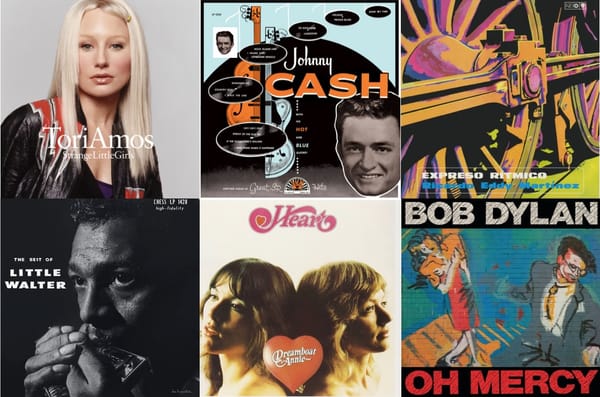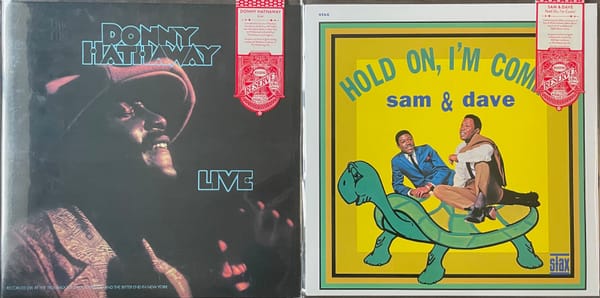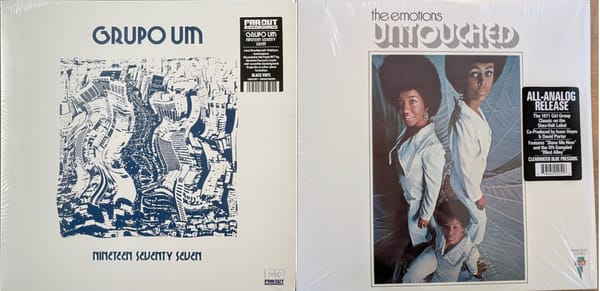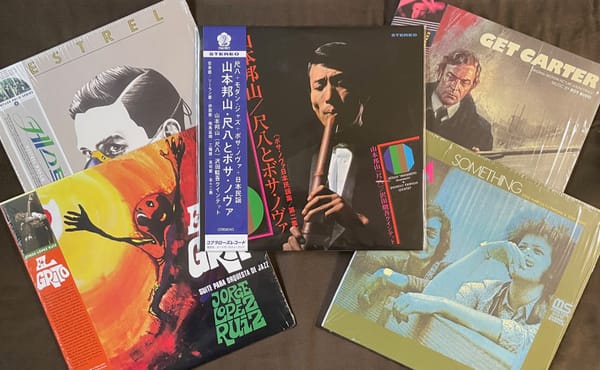Review: Warren Zevon on Rhino Reserve & Universal’s New “Vinylphyle” Series
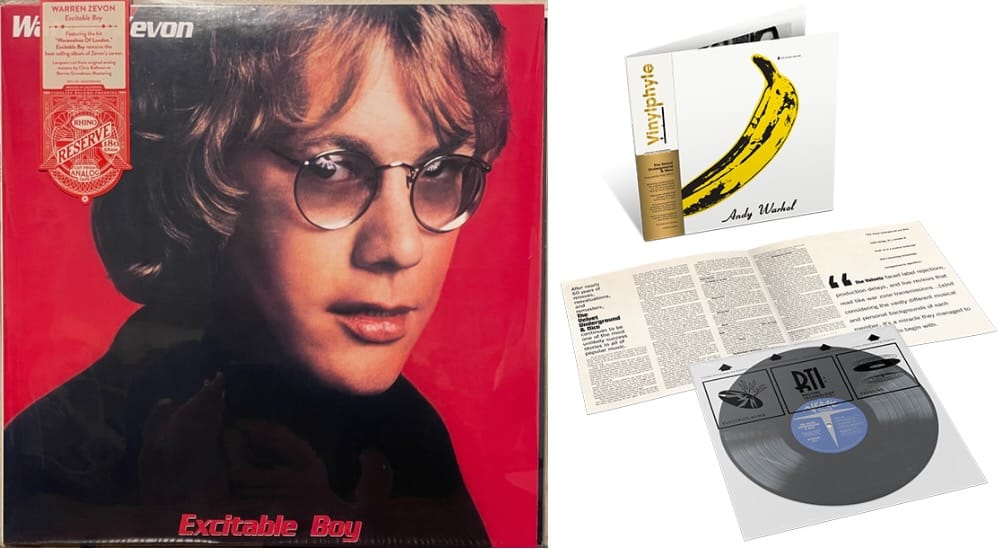
We’ve got a record review today for the last of our Rocktober titles: the Rhino Reserve edition of Warren Zevon’s 1978 album Excitable Boy.
Before we get to that, this morning’s big vinyl news is that Universal Music has just entered the premium all-analog arena with a newly launched series called “Vinylphyle.” I’m not sure why they went for the odd spelling—maybe because “Vinylphile” sounded either too sexual or too intellectual.
The Vinylphyle approach comes directly out of the Rhino High Fidelity playbook. The titles are artistically or commercially significant albums, and they’ve been given all-analog cuts purportedly from the master tapes, although they are careful to word it as “original sources.” The mastering for the first four releases comes from Joe Nino-Hernes of Sterling Sound in Nashville, Tennessee. The vinyl is pressed at Record Technology Incorporated (RTI) in Camarillo, California, and it comes in gatefold sleeves with a four-page booklet of liner notes and an obi for the jacket. At the moment, they’re only available to order in the US from uDiscoverMusic directly, and the price point is $39.98.
Four titles are available for order right now, and they are:
• Bob Marley and the Wailers: Exodus
• The Band: Northern Lights - Southern Cross
• Nat King Cole: The Christmas Song
And perhaps most interestingly...
• The Velvet Underground and Nico
Universal says the series launches November 14, but on the actual order page does not mention shipping or release dates. I imagine, then, that orders will ship out on November 14, but this isn’t exactly clear.
It’s surprising that Nat King Cole’s The Christmas Song is one of the launch titles, as that album is also getting a premium one-step release via Universal's Definitive Sound Series—orders for those ship out on November 21. I couldn’t say why Universal chose to have this album compete in two different premium formats, especially since the implication behind both releases is that they’re top-of-the-line, best-of-the-best pressings.
I’m also a little uneasy by how much the Q&A at the bottom of the order page touts the fact that these are being pressed on 180-gram vinyl, which isn’t a new, unusual, or special format in any way, and it’s certainly not one that inherently makes the record sound better.
At any rate, the Vinylphyle line will continue with two new titles each month. If these editions turn out to be the equal of the Rhino High Fidelity releases, this will be a solid series indeed, but we’ll have to wait and see how it shakes out.
Warren Zevon: Excitable Boy [Rhino Reserve]
Zevon’s 1978 commercial breakthrough Excitable Boy gets an all-analog cut from Rhino.
No one embodies the appellation “songwriter’s songwriter” better than Warren Zevon, who rose to prominence in the late ’70s with the assistance of some very famous friends—Linda Ronstadt, Jackson Browne, and members of Fleetwood Mac and the Eagles among them. His 1976 self-titled album (his second full-length, after a 1970 debut for Liberty Records made little impact) is veritable who’s-who of the Los Angeles music scene, with more guest appearances than a season of The Love Boat.
That level of support from the glitterati stands to reason: Zevon had spent years in the trenches—as a session musician, bandleader for the Everly Brothers, commercial jingle composer, songwriter for bands like the Turtles, and general knight-errant, wandering the wilds of the entertainment industry and the depths of its corresponding nightlife scene. His songs reflected his film-noir lifestyle, filled with colorful characters in desperate situations. Like Townes Van Zandt, the simple act of interpreting one of Zevon’s songs imparted a level of depth, darkness, and mystery upon a performer—an instant badge of cred in a business that’s always looking for ways to manufacture authenticity. Zevon had it in spades, and they were damn good songs to boot.
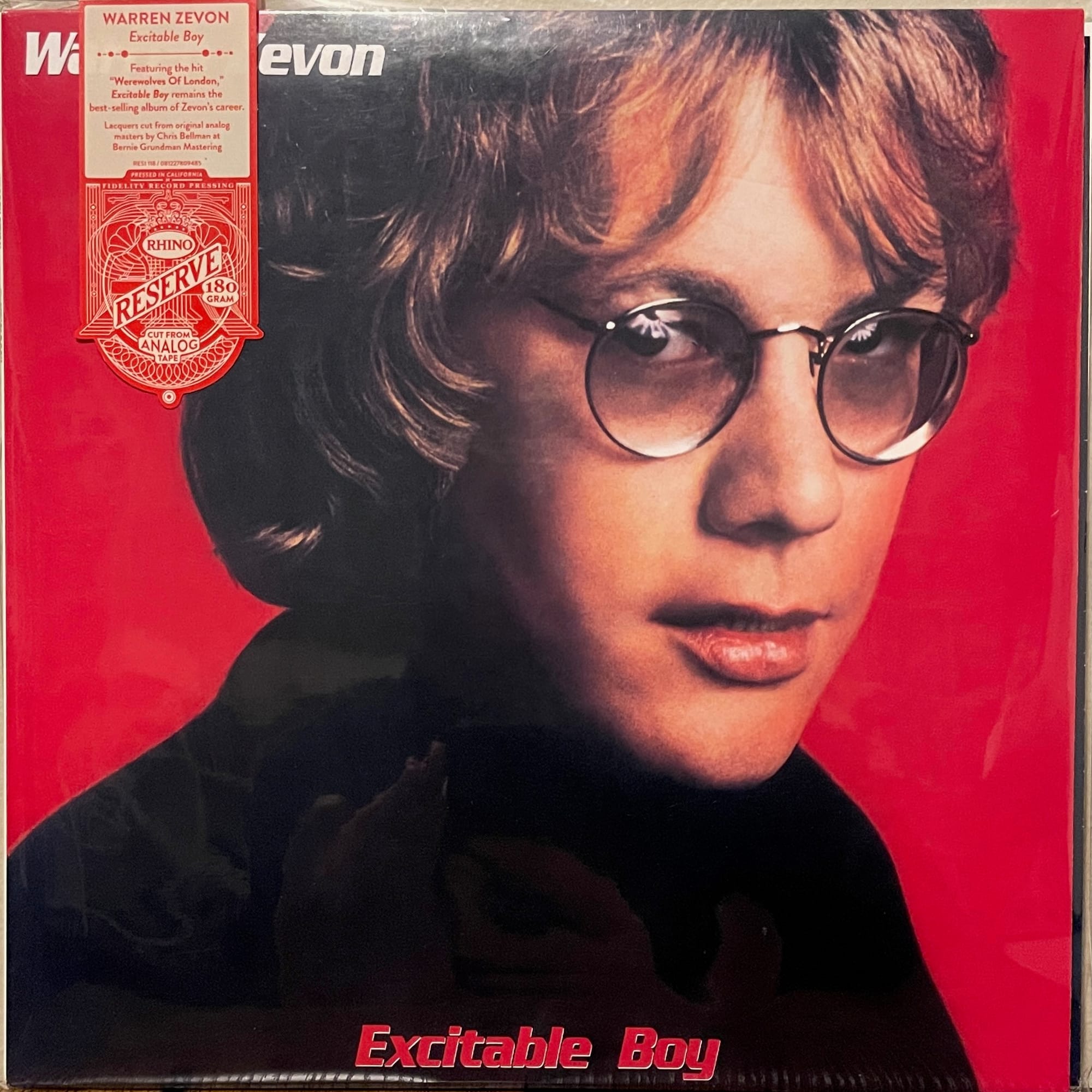
1978’s follow-up, Excitable Boy, hints that some of that hard living was catching up with Zevon. The album is conspicuously brief—nine songs, just over half an hour—and features co-writers on several songs, something Zevon didn’t have on the previous album. One of those co-writers is David Lindell, a former mercenary who owned the tavern in Spain where Zevon lived and performed in 1975. Their collaboration on “Roland the Headless Thompson Gunner” seems like it came out of a late night of heavy drinking and tall-tale-telling, and fittingly it became one of Zevon’s best-loved songs. Some of the other collabs, though, betray that Zevon’s songwriting was not at its sharpest. “Nighttime in the Switching Yard,” written by Zevon, Lindell, guitarist/producer Waddy Wachtel, and Jorge Calderón, sounds like a coke-inspired studio goof, with a hokey disco beat and meaninglessly repetitive lyrics.
In that regard, it seems like Excitable Boy must have been a pretty fun album to record. The album’s big hit, “Werewolves of London,” originated as an inside joke among musicians—it was inspired by a Phil Everly joke, written in 15 minutes by Zevon, Wachtel, and bassist LeRoy Marinell, and performed live by Jackson Browne and T Bone Burnett before Zevon ever got around to recording it. “Werewolves” is a saloon gag executed at the highest level: a catchy piano riff, a string of one-liners, and an irresistible sing-along chorus. Lacking the depth of Zevon’s more mordant material but still containing some bite (“ah-hoo”), it makes sense that, despite being one of his shallowest and silliest songs, it became his biggest hit. Album opener “Johnny Strikes Up the Band” is similarly appealing on its surface level, with an assertive beat, indelible melody, and a truly lovely bridge—but the song is also missing the incisive quality of Zevon’s best material and repeats its refrain ad nauseam, eventually sounding like Zevon forgot to finish writing the damn thing.
But with production from Wachtel and Browne and performances from the very best session musicians LA had to muster, even Excitable Boy’s cast-offs are immaculately produced. In fact, the smoothness and sweetness of the production seems deliberately at odds with Zevon’s caustic songwriting sensibilities, and that friction is, I think, the secret sauce to his records. Zevon’s journeyman years as a jack-of-all-trades musician instilled a survival instinct for commercialism, but his lyricist’s pen always had a sharper point and blacker ink than his music’s mainstream sensibilities, adding zip and spice to songs that sound initially pleasant on the surface.
This is best embodied in Excitable Boy’s most exciting moment, its closing track, “Lawyers, Guns and Money.” Zevon’s piano riff is hooky as can be, and the band employs a harder style of rock than anywhere else on the album, with Wachtel’s guitars in particular making an aggressive stand. The lyrics are about a spoiled American causing havoc in Cuba and Honduras, believing that he’s caused some sort of international incident (“How was I to know she was with the Russians too?”) but in all likelihood merely having a massive paranoid breakdown (“Dad, get me out of this”). It’s a song full of fear and loathing, a veritable short story told in four verses and change.
Excitable Boy received an excellent mastering job upon its initial American release in 1978, although there is no info in the deadwax to indicate who cut the lacquer or where it was performed. The album has been recut a few times in recent years, including a 2009 Friday Music edition cut by Ron McMaster at Capitol that was repressed on red vinyl in 2021 (and again in 2023 for Record Store Day); a 2015 Music on Vinyl pressing cut anonymously, very likely from digital; and a 2020 cut by Chris Bellman for a Rhino version on glow-in-the-dark vinyl (in both red and green varieties). Most recently, the album was cut from digital at 45 RPM for a 2-LP set from Mobile Fidelity in 2023. I have not heard any of those represses, just my 1978 original copy pressed at PRC in Richmond, Indiana, which always sounded true and clear and never left me wanting for anything.
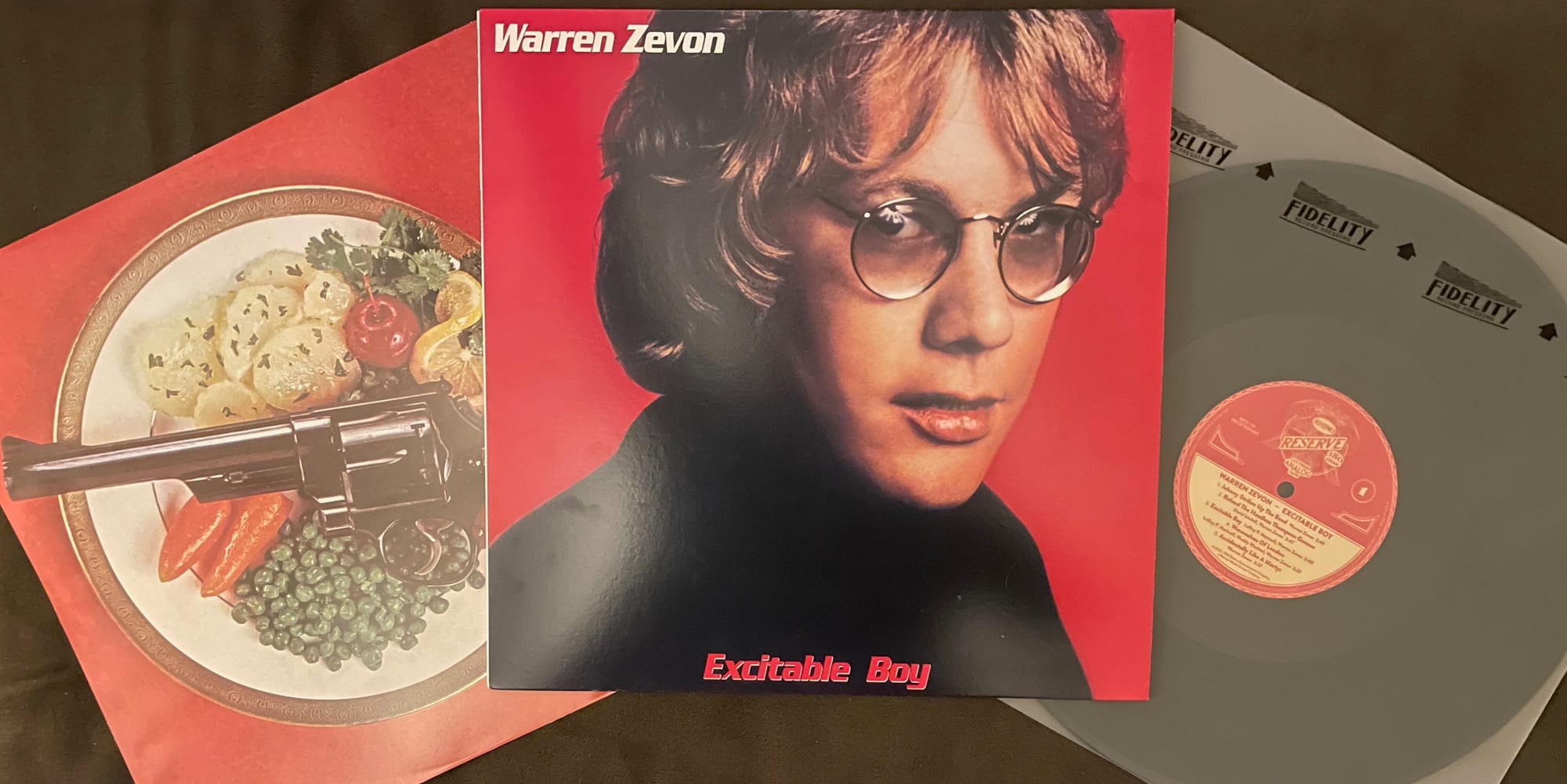
And now we have a new Rhino Reserve edition, a single-disc, 33 RPM, all-analog version cut once again by Bellman at Bernie Grundman Mastering. It’s natural-sounding, clear, and accurate. There are no fireworks or boosted levels—in fact, it sounds astonishingly similar to my 1978 copy. If hard-pressed, I would say that the 1978 has a bit more treble to it, and while that gives Zevon’s piano slightly more attack, some of the accumulated high end takes on a bit of graininess on my setup, particularly during the busier segments, making the acoustic guitars sound slightly spindle-y and the hi-hat just gently tip into white noise territory. But this feels like splitting hairs, as this 1978 pressing is as trusty and true as Roland’s Thompson gun.
The new Bellman cut gets everything right. The highs are gently reduced to cut down on their edginess, and the instrument separation is excellent, at the slight expense of the integrated musicality of the ’78. Bellman’s restraint is admirable—the bass guitar remains more melodic than earth-shattering, the guitars are all kept in proper proportion, and Zevon’s voice sounds exceedingly lifelike and present, marking an improvement over the ’78. The bass drum has the correct amount of power and presence on “Werewolves of London,” and the saxophone solo on “Excitable Boy” is sweeter and less piercing as well, slightly defanging the juxtaposition of its pop melody and its seriously messed-up lyrics. If anything, the Rhino Reserve is just that little bit more polite than the ’78, with its sonic corners subtly rounded and leaning a bit further into the California-smooth sound of the production, tempering Zevon’s blackhearted humor in the process.
The pressing, done at MoFi’s Fidelity plant, is exemplary, keeping consistent with the Rhino Reserve series thus far. My copy was flat, centered, free of background noise, and without any audible ticks or pops. In fact, the only dilemma it poses is which copy of Excitable Boy is the keeper for me. I think my ’78 is a better choice for group, party, or DJ scenarios, as its livelier high end can cut through a noisy room more effectively. But the new Rhino Reserve may be better for solo listening or for accompanying low-key household activities. It comes in an appealingly sturdy card jacket, with the disc inside a branded poly sleeve in addition to a replica of the original’s paper inner sleeve. The outer plastic protective sleeve is sealed by a hype sticker that you have to rip in order to access the record inside, my only real quibble with the Rhino Reserve series thus far.
Excitable Boy was Zevon’s commercial peak, even if most everyone agrees it was a step down from 1976’s Warren Zevon. Boasting a handful of great songs, some pretty good ones, and only one real dud (“Nighttime in the Switching Yard”), the album still feels to me like it comes up a little short all these years later. I think the addition of two more really excellent songs would have really tipped it over the edge, allowing it to attain the status of an evergreen classic and become the equal of the very best albums of the 1970s. As such, its brevity and inconsistency reveal the instability of Zevon’s artistry in terms of his lifestyle—where the good times, instead of merely informing his work, threaten to overwhelm it—and perhaps led to the cementing of Zevon’s cult-underdog status instead of becoming a more widely beloved figure. But the high points of Excitable Boy (“Roland” and “Lawyers”) are as good as we ever got from any songwriter, and part of the whole Zevon package is rolling with the waves that are part of his inherent storminess. This new Rhino Reserve edition gives us a more-than-seaworthy vessel to do so.
Excitable Boy | Rhino Reserve 1-LP 33 RPM • lacquer cut by Chris Bellman of Bernie Grundman Mastering • pressed at MoFi’s Fidelity Record Pressing • black vinyl
Listening equipment
Table: Technics SL-1200MK2
Cart: Audio-Technica VM540ML
Amp: Luxman L-509X
Speakers: ADS L980

